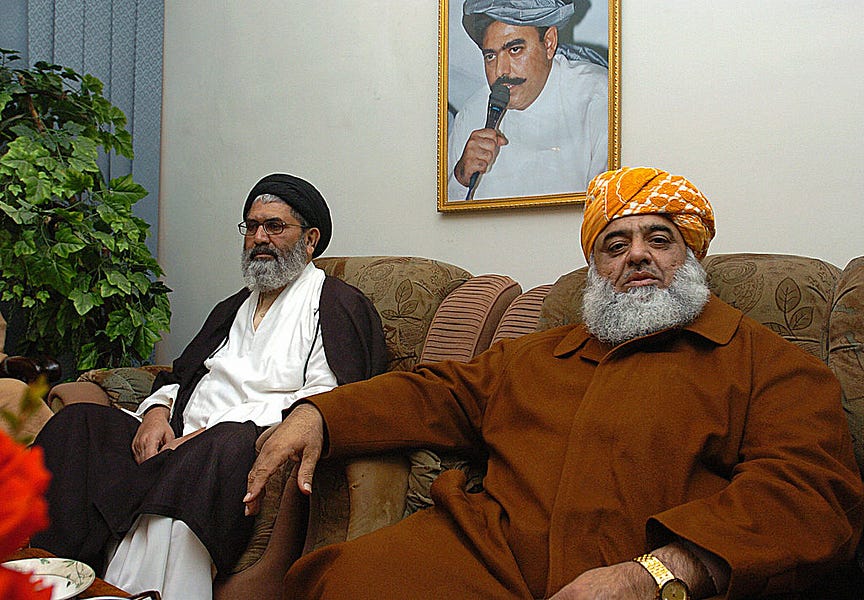A Shiite Islamist extremist group in Pakistan, tied to Hezbollah and the Iranian regime, fundraises for the families of its fallen martyrs using a global network of nonprofits, including 501(c) organizations in the United States.
Alongside its other Islamist activities—including anti-Sunni violence as well as pro-Tehran protests against America and Israel—Tehreek-e-Jafaria Pakistan (TJP) works to raise funds for the family members of Pakistani Shiite “martyrs” through an international network headed in Pakistan by TJP’s chief proxy, Shaheed Foundation Pakistan, which operates in coordination with organizations throughout Pakistan, Europe, and North America.
According to the Center for Strategic and International Studies, the TJP has called for the creation of a “popular Islamic army based on compulsory military training for all able-bodied males … to encourage the spirit of holy war.” Banned in Pakistan, TJP has changed its name multiple times to circumvent government restrictions. For some years, it went by Islami Tehreek Pakistan (ITP), which was also proscribed. Today, according to Muhammad Amir Rana in his study, A to Z of Jehadi Organizations in Pakistan, the TJP operates as Millat-e-Jaffaria or Millat-e-Jafria; a name also used to reference the collection of organizations that operate under the umbrella of TJP leader Allama Syed Sajid Ali Naqvi, the personal representative of Iran’s Ayatollah Khamenei in Pakistan.
Given its parent network, it is perhaps hardly surprising that the Shaheed Foundation Pakistan is overtly linked to terrorist groups. A 2006 post on its website includes details of a rally organized by the group in “Celebration of the Great Victory of Hizbullah over Israel and tribute to the Islamic Hero, [Hezbollah leader] Syed Hasan Nasrullah.”
Additional mentions of “martyrs” of the U.S.-designated terror group Hezbollah, as well as Hezbollah posters, are found throughout the Shaheed Foundation’s website.
In the U.S, multiple registered nonprofit organizations are connected back to TJP through the Shaheed Foundation and its main U.S. proxy, a New Jersey nonprofit named Al-Kauser.
While the humanitarian efforts of some of the American organizations in the network may appear admirable at an initial glance, ultimately, tax-free donations are moving through the 501(c) public charity system and being sent to a nonprofit founded by a banned terrorist group.
As Al-Kauser noted on its website in 2018: “Al Kauser has used over $200k to date in 2018 for education and support for orphans and families of Shuhada [martyrs] in Pakistan and India.”
It is difficult to know exactly what qualifies a TJP recruit’s death as “martyrdom.” Along with the evidence of close ties to Hezbollah, and reports that TJP splinter groups such as Sipah-e-Muhammad recruited Pakistani fighters to paramilitary groups such as Iran’s Zainabiyoun Brigade in Syria, the chief generator of TJP’s “martyrs” is most likely, as Ashley J. Tellis of the Carnegie Endowment for International Peace has noted, the group’s commitment to “bloody internal sectarian violence.” The English-language web pages of the Shaheed Foundation, meanwhile, portray its martyrs merely as innocent victims of bomb blasts targeting Shiites specifically.
The latest tax return documents reveal that Al-Kauser’s total income was $285,022 in 2019, of which $242,975 was sent directly to South Asia.
Al-Kauser has not always been the Shaheed Foundation’s primary partner. Before 2019, the Shaheed Foundation worked with Saviour USA, a Texas-based 501(c)(3). Although Saviour USA’s website has since changed, in the past it stated that “Shaheed Foundation Pakistan is an ace institution of Millat-e-Jaffaria Pakistan … In its current form this institution began functioning in 1997 based on the teachings of … Imam Khomeini.”
Today, Al-Kauser’s website lists a number of additional current partner charities both in the U.S. and abroad. It is unclear how these partnerships work exactly, although it seems likely that the partner organizations serve at least partly as funding arms for Al-Kauser.
In response to a media request for more information about Al-Kauser’s relationship to Shaheed Foundation and TJP, President Raees Zaidi denied that Al-Kauser supports or engages in any political activities and insisted that the group follows all “applicable rules and regulations of the State of New Jersey and the US Government.”
Alongside its charitable partners, Al-Kauser also lists over half a dozen Shiite mosques found across Virginia and New Jersey as its additional “partner organizations.” Furthermore, the Shaheed Foundation’s own website has previously included a list of “Islamic links,” in which several additional Shiite institutions across Europe and North America were named (listed alongside a direct link to the website of U.S-designated terrorist organization Hezbollah).
Previously ignored by those studying Islamism and the influence of the Iranian regime, there appears clearly to be a significant and wealthy South Asian Islamist network within the United States acting to support the interests of a violent Shiite movement in Pakistan.
What is TJP and its Shaheed Foundation? And what is the extent of its reach?
A close disciple of the 1979 Iranian Revolution leader Imam Khomeini, Arif ul-Hussain Al-Hussaini was chosen as the first leader of TJP (then Tehreek Nifaz Fiqah Jafaria) in 1978 to represent the interests of Shiite Muslims oppressed under Pakistan’s theocratic Sunni dictator Zia ul-Haq. Khomeini appointed Hussaini as Wilayat-e-Fiqah, or the Shiite religious leader, of Pakistan, and upon Hussaini’s 1988 assassination, Khomeini addressed him as his “dear son.” According to Mohammad Rana, Hussaini also sent many young men to train with the Hezbollah of Lebanon. Hussaini was eventually succeeded by Allama Sajid Naqvi, who was also appointed a religious representative of Iran under Ayatollah Khameini.
To address the growing number of families left behind by martyred Shiites amid sectarian, terrorist violence between Shiites and Deobandi militant organizations, Hussaini founded the Shaheed Foundation to support them.
Today, the Shaheed Foundation’s general operations are overseen by Hossein Hosseini (Hussaini’s son) and six others, four of whom are reportedly family members of other shohadas (martyrs). In addition to caring for the children of martyrs, the Shaheed Foundation also has a department to provide “spiritual support” to the families and a publications department, which serves to “publish and propagate the thoughts and courage of martyrs.”
Shaheed Foundation’s current website states that it is a “non-political, welfare organization.” In 2013, however, pages on Shaheed Foundation’s website clarified that it is “is an independent institution of Millat-e-Jaffaria.” When asked directly about its connections to TJP through a media request, a spokesman for Shaheed Foundation wrote that “we don’t have any political background, nor do we have any future plan to become a part of any political organization whatsoever. Also, we have never been a part of any banned organization, nor have we endorsed any.”
Of course, the Hezbollah flags at Shaheed Foundation “celebrations” cast doubts on such claims. Elsewhere, Shaheed Foundation’s website glorifies martyrdom in length, writing that “there is no greater achievement for a momin [Muslim believer] than to leave his abode with wounds that are medals on his chest, and his face covered in blood, in the struggle for justice.”
This is a full-fledged, terror-tied Islamist community, operating in a similar manner to other Shiite Islamist networks around the world that back the Iranian regime.
It is not limited to the United States. Shaheed Foundation has additional counterparts, or “partner charities,” across the rest of the West. In Canada, the U.K., Denmark, Norway, and Sweden it is represented by the identically-named Shaheed Foundation; in Germany and the rest of Europe, it has Support Light for Life; and in Australia and New Zealand, Light for Life. These branches raise hundreds of thousands of dollars annually according to tax documents.
Indeed, this global network provides richly for Shaheed Foundation Pakistan. In total for the year ending in June 2019, Shaheed Foundation Pakistan supported more than 2,000 families with a total equivalent to $2 million.
Across the Western world, multiple nonprofits, in connection with groups such as Al-Kauser, are able to send tax-free money overseas to an Islamist organization with that openly supports Hezbollah and the Iranian regime, all ostensibly in aid of martyrs for a banned violent organization. The full extent of this network, and of the efforts of South Asian Shia Islamists operating in North America, must be investigated further. Most importantly, this abuse of Western nonprofit systems by terror-tied extremists must be halted.
Isabella Meibauer is a writer for Islamist Watch, a project of the Middle East Forum.






Please note that we at The Dispatch hold ourselves, our work, and our commenters to a higher standard than other places on the internet. We welcome comments that foster genuine debate or discussion—including comments critical of us or our work—but responses that include ad hominem attacks on fellow Dispatch members or are intended to stoke fear and anger may be moderated.
With your membership, you only have the ability to comment on The Morning Dispatch articles. Consider upgrading to join the conversation everywhere.